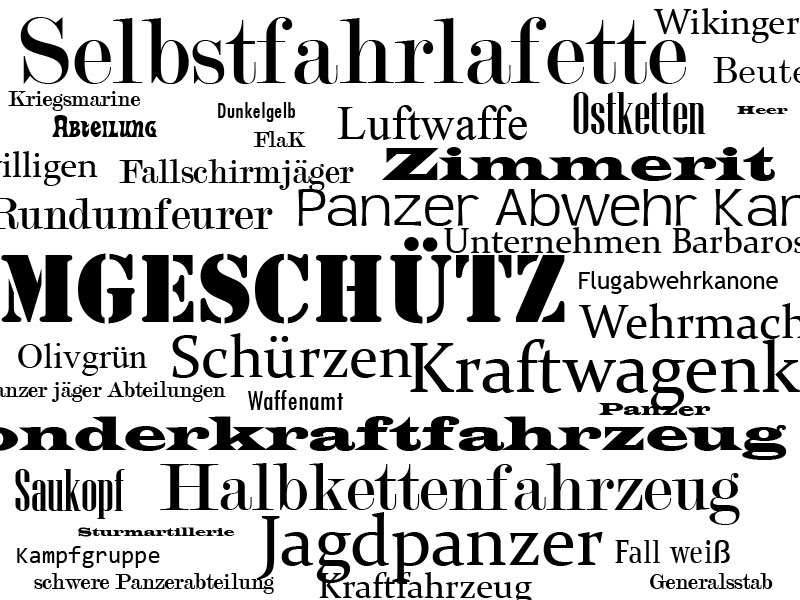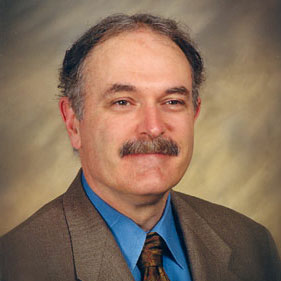1⁄1German for Modelers
100
Comments
German for modelers
Below is a list of terms that are not standard to English and therefore should be italicized in reviews. Wehrmacht and Luftwaffe are familiar even to non-modelers, but some of the terms below get thrown around, sometimes in misspelled form.Additionally, German capitalizes all nouns. So if it’s a term for a thing, group, effect, etc., you’re better off capitalizing it. When it doubt, capitialize.
1. Abteilung (pronounced “opp-tile-ung”): Battalion.
2. Bergepanther ("bear-guh pant-her" and by extension, -tiger, -leopard): Berge are mountains, but this is from the verb bergen ("to rescue"), so a rescue or recovery tank.
3. Beute (pronounced “Boy tuh”): Literally, “war booty.” Applied to captured vehicles (e.g., Beutepanzer, captured tank).
4. Das Reich (pronounced “dos Rye-kh”): Literally, Greater Germany, the "thousand year Reich" that Hitler envisioned. Most commonly used as the name of the 2nd SS Panzer Division.
5. Dunkelgelb (pronounced “doon-kell gelb”): “Dark yellow,” and capitalized because it’s a noun (remember, all German nouns are capitalized).
6. Fahrgestelle (pronounced "Far-guh-shtell-uh"): Chassis.
7. Fall: “Case” or "operation," as in Fall weiß (“Case White,” the invasion of Poland in 1939).
8. Fallschirmjäger (pronounced “Fall Sheerm Yayger”): Paratroops.
9. FlaK (pronounced like “flock”): A combination of Flug-Abwehr-Kanone (anti-aircraft cannon, usually written as a single word, Flugabwehrkanone) and is usually capitalized.
10. Flammenwerfer (“flah-men vair-ferr”): Flame thrower.
11. Freiwillige (“Fry vill-ee-guh”): Volunteers (as in Freiwillige Division, pr “volunteer division”).
12. Funk (“Foonk”): Literally “spark.” Applied to any radio or radar device.
13. Halbkettenfahrzeug (“halb ketten far tsoyg”): Half tracked vehicle.
14. Jagdpanzer (“Yah-gd Ponz her”): Literally, “Hunter Tank”; any tank destroyer. Jagd (“the hunt”) is sometimes replaced by Jäger (“hunter”) as in Panzer jäger Abteilungen (“tank destroyer battalions”). Other variants include specific vehicles like the Jagdpanther and Jagdtiger.
15. Kampfgruppe (“compf groop-uh”): "Fighting group"; a loose term for any ad-hoc combat formation with a specific task, often comprising troops and vehicles from various unrelated units. The plural is Kampfgruppen with an "n" at the end (the most-common way of making a noun plural).
16. Kraftfahrzeug (“Croft far tsoyg”): Any powered vehicle, abbreviated Kfz.
17. Krankenkraftwagen (pronounced "Kronk-un-Croft-vah-guhn"): Ambulance.
18. Kriegsmarine (“creegs marine-uh”): The German Navy in WW II (the military branch, not including the merchant marine).
19. KWK: short for Kampfwagenkanone (“Croft vah-gon kah-no-ne”): Literally “fighting vehicle gun,” aka tank gun.
20. Lafette (pronounced “lah-fet-uh”): Gun platform (actually a French noun taken over whole into German but with a German pronunciation).
21. Leibstandarte (pronounced “lie-b shton dart-uh” like “to lie down” and not like “leeward”). Hitler’s personal bodyguard, which eventually grew into the 1st SS Panzer Division. 22. Luftwaffe: Accepted in English without italics, but pronounced with a “V” instead of the W sound, and similar to “Wehrmacht” (VERR macht).
23. Olivgrün (pronounced “o-leave groon”): “Olive green” See Dunkelgelb above.
24. Ostketten (the “ost” is pronounced like “Austen, Texas”): “East tracks” Various track width extensions designed to provide greater traction in the ice and snow of the Eastern front for Germany's narrow-width tracked vehicles like the Pz. III and IV.
25. PAK (pronounced “pock”): Panzer Abwehr Kanone (anti-tank gun). Should be all caps.
26. Panther (pronounced “Pant-er” in German). The famous Panther tank and variants (see Jagdpanther above). NOTE: the "h" is silent when it follows "t" in German.
27. Panzer (pronounced “Ponz her” not “Pans ur”).
28. Porsche (“Porsh-uh,” NOT “Porsch”): Ferdinand Porsche designed numerous tanks for the Wehrmacht, and his company became famous after the car for building sports cars.
29. Pz.Kpfw. abbreviation of Panzerkampfwagen (“Ponz uh compf vah gun”): Tank (literally “armored fighting vehicle”)
30. Rundumfeurer (pronounced “roond-oom foy rer): Literally “firing all around.” An automatic rotating external MG mounted on several different German vehicles.
31. Saukopf (pronounced “zow-kop-f”): “Pig’s head” An informal name applied to mantlets on several German assault guns and tank destroyers. The term was not official, but widely-used by the troops (the correct term is Topfblende.(literally “pot lid”).
32. Schürzen (pronounced “shoor-tsen”): Literally, “aprons.” The protective side plates attached to German armor to defend against anti-tank projectiles and rocket-propelled grenades.
33. Schützenpanzer (pronounced "shoo-tsen Ponz-uh"): Literally "rifleman's armored vehicle. An armored personnel carrier, whether tracked or wheeled (usually abreviated SPz.
34. Sd.Kfz. abbreviation of Sonderkraftfahrzeug (pronounced “Zawn der croft far tsoyg”): Any “special powered vehicle,” but usually applied to halftracks.
35. Selbstfahrlafette (pronounced “zelb-stuh-far lah-fet-uh”): Self-propelled gun platform (see "Lafette" above).
36. sPA: schwere Panzerabteilung (pronounced “sh-verr-uh pahn-tser ob-tile-oong”): “Heavy tank battalion. The initial “s” is NOT capitalized because it’s not a noun.
37. Stab (“Shtawb”): Staff (as in Generalsstab, “general staff”).
38. Sturmartillerie (pronounced “shtoorm artillery”): The collective term for the Sturmgeschütz and other non-tank motorized guns and gun platforms.
39. Sturmgeschütz (pronounced “shtoorm guh-shoots”): “Assault gun.” A turretless armored gun platform designed to support infantry.
40. Tarnjacke (pronounced "Tarn Yah-kuh"): A camoflaged jacket.
41. Tiger (pronounced “tee ger”). The feared Tiger tank and variants (see Jagdtiger above). The Tiger II is the Königstiger (pronounced "Cur-neegs-tee-ger"), which is incorrectly translated as "king tiger" when it actually means "Bengal tiger."
42. Unternehmen (pronounced “oonter name en”): “Operation,” as in Unternehmen Barbarossa (“Operation Barbarossa,” the invasion of the Soviet Union).
43. Waffenamt (pronounced “Vaw-fen Ahmt”): The procurement organization of the Wehrmacht. The full name is Heereswaffenamt.
44. Wehrmacht (pronounced “vair mah-cht”): Well-established in English, but frequently mistranslated as the “army” when in actuality it designated ALL of the Nazi branches of the military. The German army under National Socialism was comprised primarily of the Heer (pronounced like the hair on your head). The Waffen SS were not under the command of the Army, but under the direction of the Wehrmacht, which was headed by Hitler himself after 1938.
45. Wikinger (“vee king er”): Literally, “Viking.” The 5th SS Panzer Division, made up originally of volunteers from Scandinavian countries. The German is never spelled “Wiking,” an error that has crept into modeling and historical references, too.
46. Zimmerit (pronounced “tsim-err-eat”): The anti-magnetic paste applied to some tanks during the mid-war; should be capitalized and in italics, as it’s a foreign word, even if familiar to modelers.
Update: a small file on you tube for those who would actually like to hear the words spoken: My thanks to Marco Sari for doing this.
Comments
The best Wiener Schnitzel I ever ate was in, of course, Vienna. Best Sacher Torte was in the cafe of the Sacher Hotel there. But I'll take a well-made German Schnitzel over Sauerbraten any day of the week.
There are many things the Germans do well. Cooking unfortunately, isn't one of them. [/quote]
Well, we do beat the British and Irish since we have discovered these strange thing named "seasoning" and "spices".
Well, unless "Indian" counts as British/Irish these days
=================
Jokes aside, Sauerbraten, even more so the version with horsemeat, IS an aquired taste and even many germans do not like it (I grew up with it being 1/2 east prussian), same for stuff like boiled filet with horseradish-sauce or tongue, liver (complete, fried), kidney (fried)
OTOH german stews, even more so from the big pot and warmed up once are something one should try. Peas, White beans or Lentils with some nice coarse sausages are something I could not live without. Take the Tofu, take the soy - you can't take my stew from me
Oh and marzipan. If you ever come to Lübeck (or near it) visit Niederegger and taste some.
JUN 08, 2016 - 04:26 AM
I was just in Kilkenny and the Irish have discovered how to cook (likely from their diaspora coming home to open good restaurants).
I went to the Mozart Balls factory in Bavaria many years ago. While awful after sitting on the shelves for awhile, they were delightful coming fresh off the assembly line. For those who don't know, they are marzipan- & pistachio-filled chocolates wrapped up in foil with Wolfgang Amadeus' face on them.
JUN 08, 2016 - 08:30 PM
Those of us lucky enough to have been stationed in or near Baumholder and Idar Oberstein, know the joys of Spiessbraten! Now THAT is some good eating!!!
JUN 09, 2016 - 02:10 AM
The Kompaniefeldwebel asked me to stress the fact that the receipt for Spiessbraten does NOT! I repeat NOT! involve a Spiess. So would the hungry soldiers please stop looking at him.
JUN 09, 2016 - 03:12 AM
Hi German students,
Here's a word that's being constantly misspelled (and probably mispronounced) by English speakers: "Balkenkreuz" - you know, that identification cross on Wehrmacht vehicles.
It's a combination of "Balken" and "Kreuz", with the latter meaning "cross" and the former "(wooden) beam", so it would be "beam cross", as opposed to the flared-ended "Iron crosses" used by the Kaiser's forces and today's Bundeswehr.
Pronunciation is something like "bulk'n'croyts", with the emphasis on the first syllable; pl.Balkenkreuze, pronunciation bulk'n'croytsah, emphasis again on bulk.
So please don't copy Archer's spelling, will you?
Peter
JAN 01, 2017 - 01:26 AM
Oops!
Archer now DOES spell it right! Guess I should've checked before I posted ...
Peter
JAN 01, 2017 - 10:38 PM
Something I don't understand about the US educations system is this: In lower grades, we studied German. I believe it was something like one hour a day. When you reach senior high school and are required to take a foreign language, German is not an option. My grandfather was a German immigrant, my dad was stationed, in Germany and my sister was born, there. I recently realized, that my great grandfather would have fought for Germany, during WWI. I know this is a little off-topic, but it seemed to fit.
MAR 15, 2018 - 02:49 AM
Not the fault of the US education system, but of the availability of a qualified teacher to teach the subject as well as the number of students willing to take a particular language at your school. German was an option for me in high school as we had plenty willing to learn it and several teachers available to us. No one wanted to take Latin although we had a teacher for it. There was no teacher available for any Asian language when I went there, but it may be different now.
MAR 15, 2018 - 03:20 AM
Americans in general don't learn foreign languages, at least not like people in Europe who often speak multiple languages. We're a bit spoiled because the whole world wants to learn English, often for business or work-related matters. I was recently in Japan for 2 weeks on business, and everywhere in the cities were ads "learn English."
Off-topic, but nonetheless we can always chat about things here.
MAY 07, 2018 - 05:16 AM
Copyright ©2021 by Bill Cross. Images and/or videos also by copyright holder unless otherwise noted. The views and opinions expressed herein are solely the views and opinions of the authors and/or contributors to this Web site and do not necessarily represent the views and/or opinions of Armorama, KitMaker Network, or Silver Star Enterrpises. All rights reserved. Originally published on: 2009-12-29 00:00:00. Unique Reads: 23678










